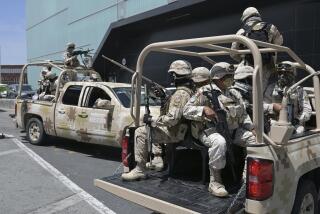Signing of Ivory Coast Cease-Fire Bogs Down
The signing of a cease-fire to stop Ivory Coast’s deadliest uprising in three years was delayed Saturday, forcing an uneasy wait for an end to fighting.
High-ranking mediators, who flew to Yamoussoukro, the capital, for the signing blamed the government for the delay.
Although rebels were ready to approve the cease-fire, an army officer who was to sign for the government was still waiting for written authorization from Abidjan, the former French colony’s commercial capital, mediators said.
“We have not encountered any difficulties on the side of the rebels,” said Lassana Traore, Mali’s foreign minister. They “are ready to sign.”
Late in the afternoon, French troops providing transportation and security for the mission said it was too late to continue, prompting the mediators’ return to Abidjan.
The participants, including foreign and defense ministers from six West African countries, said they would seek an explanation for the delay from Ivorian President Laurent Gbagbo.
Regional leaders have pressed for a cease-fire to clear the way for peace negotiations.
The signing was originally planned for Friday, but instead government ministers and mediators spent the day locked in an Abidjan hotel discussing the document’s wording.
Traore said Ivorian ministers contacted Saturday promised that an official mandate allowing regional commander Col. Philippe Mangou to sign would be carried to Yamoussoukro. But as daylight faded, there was no sign of the document.
Government officials could not immediately be reached for comment.
A negotiator, Cheick Diarra, said late Saturday that the delegates were told that Mangou had since been given authorization to sign. Diarra said the envoys planned to meet with Gbagbo today and will travel to Yamoussoukro again.
Gbagbo’s administration appeared caught between regional heads of state pressing for a truce and popular pressure to rout the rebels, who have taken control of the north.
In Abidjan, government backers, many draped in national flags, marched through the business district to show their support.
In Lakota, west of Abidjan, government supporters rallied to mourn a Cabinet minister shot dead in the rebellion’s first hours. Women with leaves in their hair and painted faces performed ritual funeral dances.
The rebels, however, appeared to have garnered support in the north, where people complain that the southern-based government treats them as second-class citizens. Northerners are predominantly Muslim and come from different ethnic groups than the largely Christian southerners.
More to Read
Start your day right
Sign up for Essential California for news, features and recommendations from the L.A. Times and beyond in your inbox six days a week.
You may occasionally receive promotional content from the Los Angeles Times.






